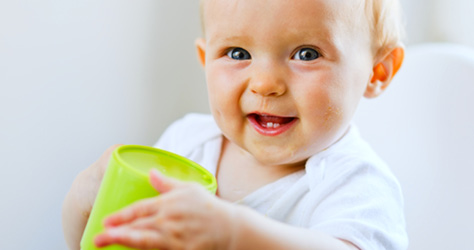Your baby will still drink plenty of milk when they start on solids, but help them learn to like drinking water as well
Here’s our step-by-step guide to what to offer and when
At a glance
- At 6 months, you can offer your baby a few sips of water or well diluted juice with their meals
- Milk is an important source of nutrition so make sure they still get plenty
- Drinks that contain sugar, including fruit juices, should be avoided as they can harm milk teeth and cause diarrhoea

What you’ll need
Before you start, your baby will need a lidded cup. “Choose one with a free-flow lid so that your baby doesn’t have to suck, and learns to drink properly,” says Bounty’s paediatric dietician, Judy More. “By the age of one year your baby can be having their water or milk from an un-lidded cup.”
6 months +
When your baby is eating more than just a few teaspoons of food, you can offer them a drink of water from a lidded cup with meals. Just a few sips of water is advised and not even well-diluted fruit juices are advised as these can encourage a taste for sweet drinks. Infant squash and herbal drinks are usually very sweet so best to avoid them too.
How much milk?
- As your baby eats more they will cut down the amount of milk they drink – you will not notice this when you are breastfeeding but with bottles of milk allow them to stop when they have had enough.
- When you begin offering a second course of fruit and/or yoghurt after a savoury course your baby may refuse a milk feed altogether or drink less.
Cow’s milk isn’t suitable as a main drink until your baby is one, but it’s fine to cook with until then.
12 months +
By now, your toddler should be drinking from a cup – water is the best choice. Babies can start having full-fat cows’ milk as a main drink by 1 year old instead of formula or breast milk. But if you and your baby are happy and want to continue with breastfeeding, the World Health Organisation recommends "mothers worldwide should exclusively breastfeed for the first six months to achieve optimal growth, development and health. Thereafter, babies should be given nutritious complementary foods and continue breastfeeding up to the age of two years or beyond." If you do decide to move to full-fat milk, it contains important nutrients like calcium, vitamin A and B vitamins and provides energy for an active toddler. (When your toddler reaches two, you can change to semi-skimmed but this isn’t necessary and they will get more vitamin A for their immune system if you keep them on full fat milk).
Drinks to avoid
Babies only need to drink water and milk. Some drinks really aren’t good for babies and toddlers – even if they’re designed to look healthy. They may be so loaded with calories they leave your child feeling too full for proper nutritious meals. And many contain lots of sugar which can harm milk teeth and in large amounts could cause diarrhoea. So it’s best you avoid:
- Fizzy drinks
- Squash
- Flavoured milk
- Fruit drinks
- Neat fruit juice
- Diet or reduced sugar drinks
- Tea and coffee